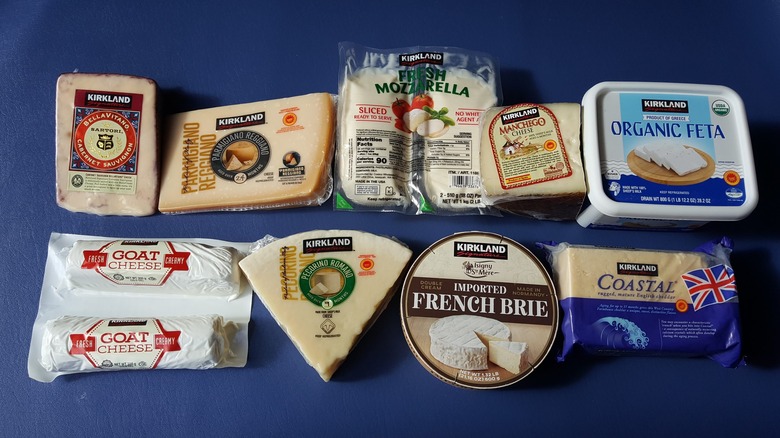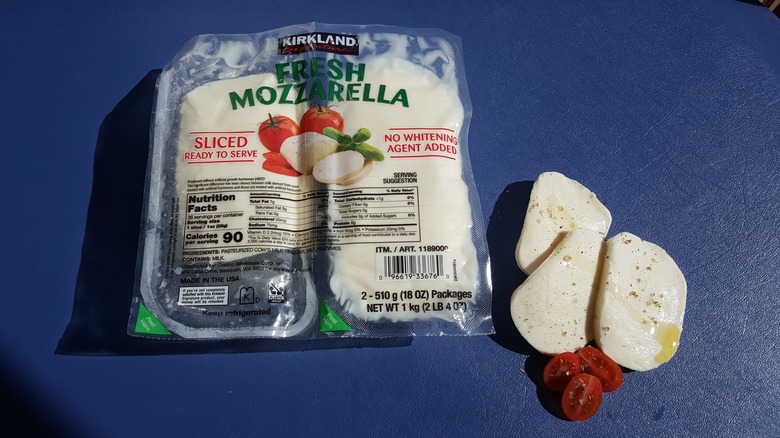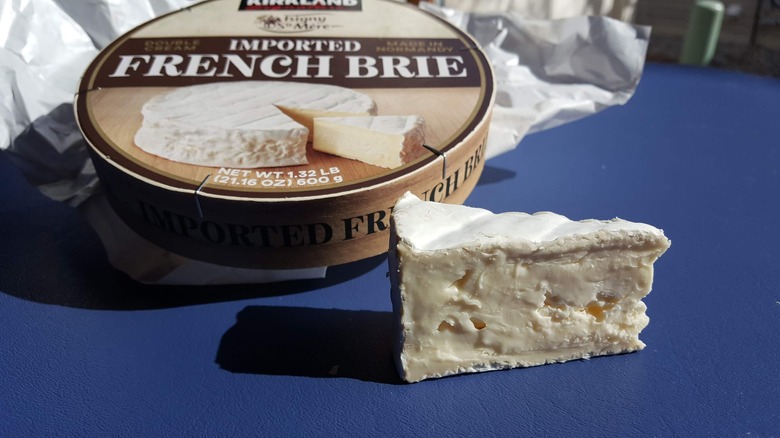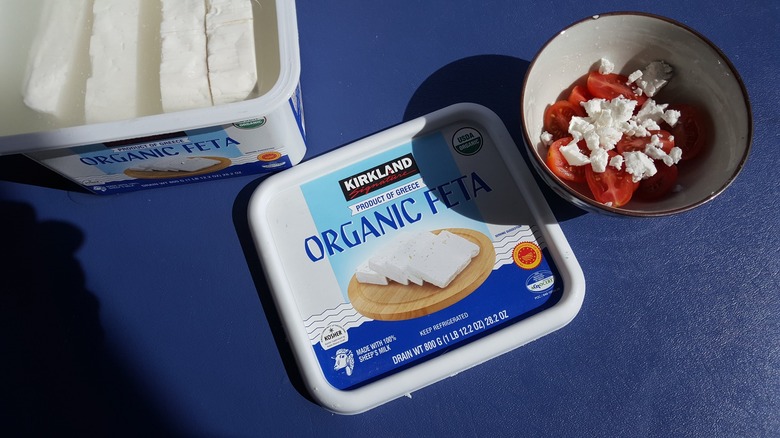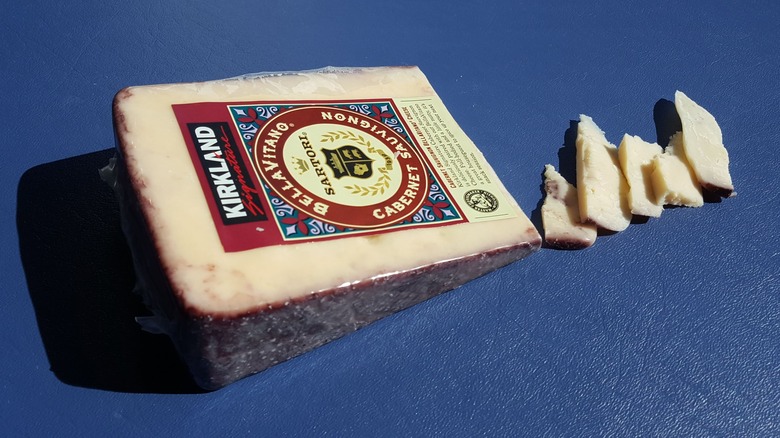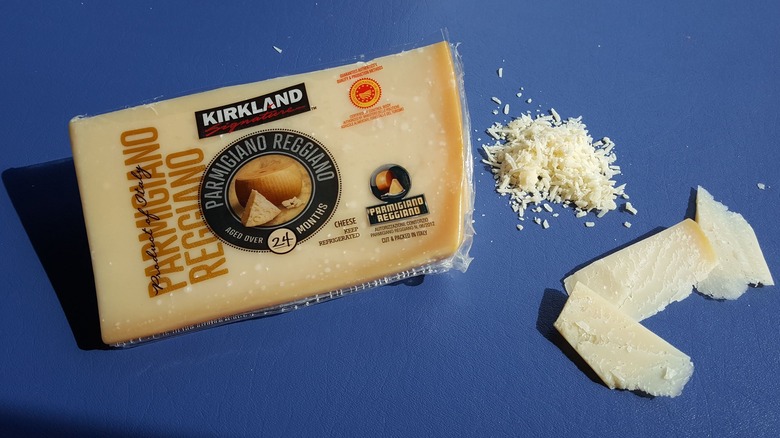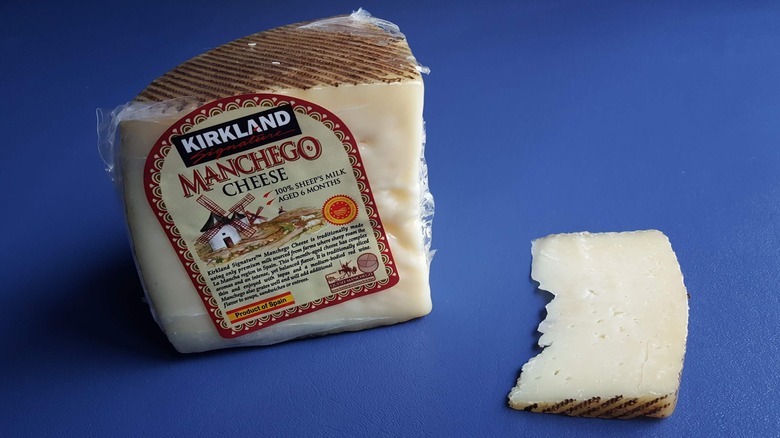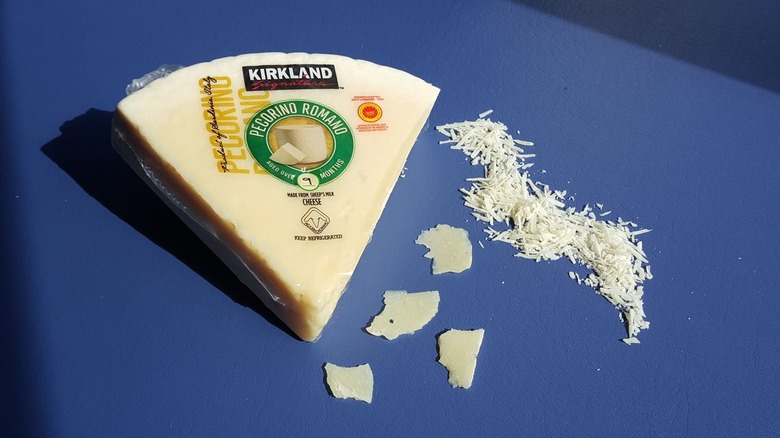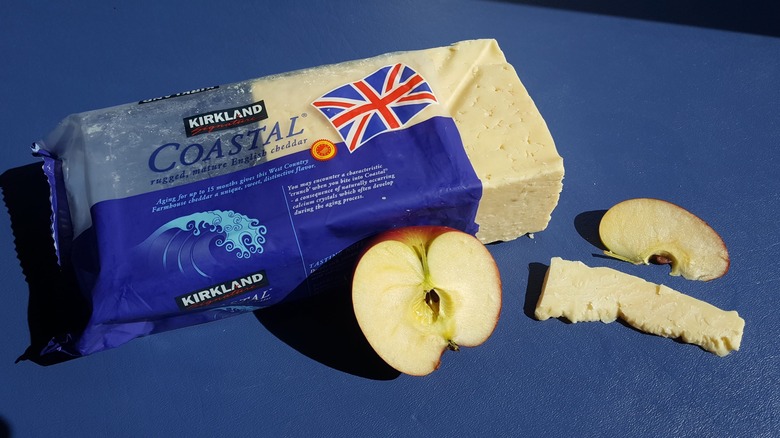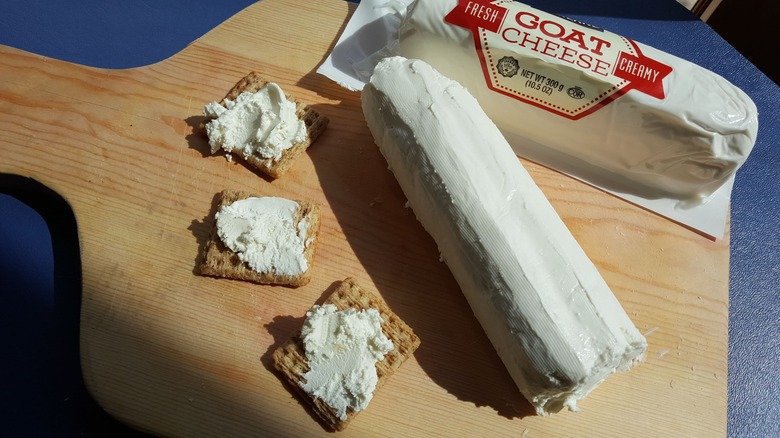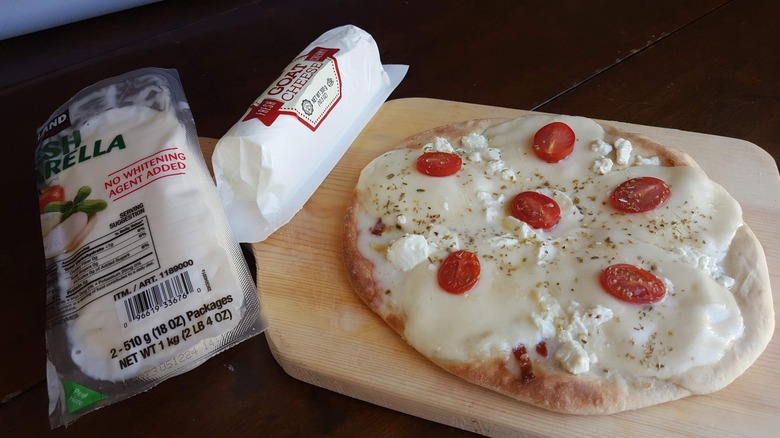9 Kirkland Cheeses At Costco, Ranked
Before you invite friends to a spring picnic of wine and charcuterie, take a trip to Costco's deli refrigerator for some Kirkland Signature cheeses. To impress your guests, though, you'll need to know which ones to buy and which to skip. Spoiler alert: Kirkland's price-quality relationship is so good that every cheese we found on our trip proved to be a worthwhile purchase. The in-house brand graced the packaging of around 10 cheeses, although the stock at each warehouse varies (we were able to grab nine at our location). Some are fresh, meaning they are soft, moist, and perfect for melting. Harder and oftentimes more flavorful cheeses have been aged for as much as 24 months.
Each cheese shines best under different circumstances, so it's difficult to compare them to one another. A cheese that tastes best crumbled over a salad simply doesn't perform the same as another that's most delicious baked with fruit. Consequently, our ranking is highly subjective and personal. That said, cheeses that exemplified a variety or had a Protected Designation of Origin (PDO) seal tended to get a higher ranking.
Another consideration was how the per-ounce price of each cheese compared to similar products available at other grocery stores. Lower prices tended to result in a higher ranking. The amounts here are accurate for the time and region where we tried the cheeses, but may change in the future or depend on the location. If you're curious about how we picked which cheeses to review and what specific characteristics we looked at, check out the methodology section at the end of this article.
9. Mozzarella
Costco's Kirkland Signature fresh mozzarella cheese is perfect for creating a refreshing caprese salad. It comes pre-sliced, too, so you can easily pull out pieces and layer them together with tomatoes and basil, though this potentially limits other applications. The sweet milky flavor is delicious and since it's a fresh cheese, producers don't need to use much salt when making it. That comes through in the flavor. This cheese is also high moisture — you can tell because it's spongey when you squeeze it, but it's not slippery or slimy. If you plan to make pizza, this particular variety of cheese could result in a soggy crust due to the high water content. Either drain fresh mozzarella before adding it as a topping or choose to eat it fresh in a different dish.
The most traditional Italian mozzarella uses buffalo milk and is called mozzarella di bufala. Getting ahold of this variety in the U.S. is complex and Costco doesn't carry it, likely an intentional choice. The buffalo milk cheese has a very short shelf life of just four or five days. Additionally, Americans are more used to the taste of cheese made from cow's milk anyway, which is what Kirkland often caters to. Shoppers looking for a more strictly traditional choice may be disappointed.
A two-pack of mozzarella from the warehouse costs about $7.70 and contains over two pounds of cheese, bringing the per-ounce price to just over $0.20. A similar fresh mozzarella from Kroger costs about $0.55 per ounce.
8. Brie
Kirkland brie cheese is creamy and smooth with a soft flavor. Some varieties of brie have a stronger, more ripened taste, but this isn't the case here. So, even if this particular mild variety of soft cheese isn't one of your favorite flavors, you may still like Kirkland's. Warming it for a few seconds in the microwave will accentuate its nutty undertones and give it an even more smooth texture. If you're having company, bake a whole wheel and pour a jar of jam over the top. You'll have created a tasty appetizer with very little effort that will be an excellent step in building a perfect charcuterie board. Alternatively, this cheese also makes a wonderful mid-afternoon snack when it is simply eaten with crackers.
Costco partnered with Isigny Ste. Mere, a French cheesemaker, to produce this item. The company makes the cheese in Normandy, though that's not the Brie region that is closer to Paris. This means that you won't find a PDO seal on it, but the quality is still top-notch if you can look beyond the lack of an official sign-off.
A wheel of Kirkland brie costs about $10, though prices may vary by location. It weighs around 1.3 pounds, making the per-ounce price just under $0.50. That means it is slightly cheaper than buying the President brand from Walmart where a pound typically costs $10 (just under $0.60 per ounce).
7. Feta
If you need cheese for a light meal — Greek salad, anyone? — then Kirkland feta is a top choice. It's also delicious crumbled over tomatoes or pasta. Or skewer a cheese cube, cherry tomato, and a bit of cucumber, finishing the charcuterie-worthy snack with a drizzle of olive oil and a sprinkling of pepper. This salty, tangy cheese wakes up the taste buds and leaves them wanting more.
Inside the plastic tub, blocks of cheese rest in brine, which results in superior flavor and texture. You can purchase this cheese in pre-crumbled form, but it is disappointingly bland and dry. Both carry the red and yellow PDO seal, which guarantees that this feta comes from mainland Greece and that producers closely follow the traditional process and ingredient list. In this case, that would include using 100% sheep milk (Greek fetas can incorporate up to 30% goat milk and still get the seal). Feta produced in the U.S. without the seal means that cow's milk is likely the main ingredient, which all too often makes a too-salty, nearly flavorless feta knockoff.
This 28.8-ounce tub of feta costs about $13 or $0.45 per ounce. Buying PDO feta at Walmart costs around $0.75 per ounce. That's more expensive, obviously, but there's another deterrent to heading there — it's not always easy to find this high-quality product. Grocery store dairy sections are more likely to contain pre-crumbled feta made in the U.S. The Kirkland feta at Costco is the authentic stuff.
6. BellaVitano Cabernet Sauvignon
The eye-drawing purple rind on Cabernet Sauvignon-infused BellaVitano makes it an alluring choice for a fruit and cheese platter. This is a hard cheese, but it is still easy to cut into slices without any crumbling and has a creamy inner texture. The taste is spicy and fun. Follow a bite with a couple of grapes and you'll activate just about every tastebud in your mouth.
To offer this item, Kirkland Signature partnered with well-regarded Wisconsin cheese maker Sartori. To many shoppers, it surely feels good to see a cheese made in the midwest U.S. among the ranks of so many European products, especially since this one, in particular, has a high level of quality and care in its production. Sartori sells many types of BellaVitano — Merlot, pepper, basil tomato, and Tennessee whisky — but no Cabernet Sauvignon. Costco seems to have a monopoly on this flavorful variety, so chances are good that you'll have to head to your local Costco if you want to try it.
This variety of BellaVitano costs around $0.50 per ounce from the warehouse. That means a typical wedge that weighs just under a pound is less than $8. Buying the Merlot-infused variety straight from the cheesemaker costs more than double that amount — adding a 5.3-ounce wedge to your digital cart means paying around $7.
5. Parmigiano Reggiano
Few things are more mouthwatering than freshly shredded parmesan served over pasta, no matter whether your sauce is marinara, pomodoro, or puttanesca. If you're used to sprinkle-on parmesan that comes in a plastic shaker, using Kirkland's parmigiano reggiano will be a treat. This product imparts a surprisingly strong earthy, salty, and savory flavor that takes any dish up a notch. Even if you usually buy hunks of this cheese variety from the supermarket, the quality and price of Costco's in-house brand will surprise you.
This cheese, in contrast to the aforementioned sprinkle-on poser, has a PDO seal (DOP in Italian, which may be stamped on the rind). That means the producer must come from Parma, Reggio Emilia, Modena, or Bologna and can only use three ingredients — cow's milk, rennet, and salt. Then, the wheel must age at least a year. Kirkland's label boasts 24 months.
The high price of Parmigiano Reggiano pushes many to buy domestically made parmesan cheese, but Costco offers it at a much lower price, at just over $0.60 per ounce. A pound and a half is about $16.50. Buying authentic stuff costs more than a dollar per ounce at a grocery store like Kroger. If more than a pound seems like too much to use, split it with a friend or remember that wrapping it in parchment paper can keep it at peak quality in your fridge for about two weeks. Even so, this may be one of the pricier cheeses you encounter at your local Costco.
4. Manchego
Kirkland's manchego cheese has a wonderfully pleasant taste, though it's not for anyone who's hoping for an especially pungent experience. Rather, it's just about perfect for snacking on with a baguette of bread. It also is lovely on a cheese board, where it plays well with many other flavors. Make a traditional Spanish dessert by placing a thin slice of manchego under a slice of membrillo, a nearly solid quince jam common in Spain and Latin America, and a favorite food of Pope Francis. Homemade fruit leather is an acceptable substitute for the difficult-to-find membrillo.
Cheesemakers have to meet specific requirements to produce the PDO manchego on sale at Costco. First, they must work in La Mancha region of Spain — you probably recognize it from "Don Quixote" or the musical "Man of La Mancha." Cheesemakers only use the milk of the manchega breed of sheep. The minimum time to age manchego is 60 days, but Kirkland's cheese took six months.
Buying Costco's manchego costs about $0.75 per ounce, making a hunk of the cheese around $20. However, at Kroger, the price jumps to more than $1 per ounce. Time may not be on your side either way, however. Consider carefully if you'll be able to eat 1.5 pounds of manchego before it dries out or starts to taste funny.
3. Pecorino Romano
If you think Parmigiano Reggiano doesn't have enough flavor, then you'll probably love the more robust Pecorino Romano. The Kirkland Signature version currently for sale at Costco is especially tasty. This is a funky, gamey cheese with a lot of flavor and personality. It makes a great topping for pasta when shredded. It has a long history as well — the poet Virgil mentioned the Roman legions gave a daily ration of 27 grams (just under an ounce) of this cheese to each soldier. Some Italian dishes like cacio e pepe and spaghe alla carbonara specifically call for pecorino romano.
You'll find a PDO seal on this Kirkland Signature Pecorino Romano, which means that the cheese comes from Rome or the Sardinia region and the main ingredients are sheep's milk and rennet from lambs. This cheese must age for at least nine months. Buying any cheese that only says Romano and doesn't have the seal on it means the main ingredient is likely cow's milk and that the result will have a flavor is vastly different from an authentic pecorino romano.
A nearly two-pound piece of this cheese costs about $18, making each ounce around $0.55. That's a fantastic deal considering that Kroger offers a single pound for about $19, nearly doubling the price.
2. Coastal West Country Farmhouse Cheddar
The nutty flavor and smooth texture of Kirkland brand cheddar will surely draw you in. Then, the light crunch of naturally occurring calcium crystals in this cheese will completely hook you. A slice cut straight from the block is a perfect snack all on its own, but you'll also get great results when you use this particular cheese in cooking since it melts beautifully. Is anyone up for a grilled cheese sandwich that will blow your mind?
This PDO cheese comes from Somerset, Dorset, Devon, or Cornwall, England (Cheddar is also the name of a village in Somerset). To use this seal, local cheesemakers must use a certain percentage of milk directly from the cows on their farm and make it on-site. Finally, they have to age it at least nine months. Kirkland's cheddar is aged even more — 15 months — which gives it a wonderfully complex and sharp flavor.
An ounce of Costco's Coastal cheddar will cost you just over $0.40 making the nearly two-pound blocks on the warehouse's shelves about $13, depending on location. Try to compare that price to other West Country Farmhouse cheddars at the grocery store, and you might be frustrated — it's not easy to find cheese with this PDO. If you wanted to buy a similarly aged cheddar made with milk from grass-fed cattle, you might spend about $0.70 per ounce for a well-regarded brand like Kerrygold.
1. Goat cheese
When you take a bite of Kirkland Signature fresh goat cheese, the first thing you'll notice is the ultra-creamy texture of this cheese. Next you'll detect a delicious but lightly sour note. In short, it's exactly what goat cheese should be. This product is also versatile and you can use it to upgrade any recipe you'd usually prepare with cream cheese or a similar soft cheese. It tastes fantastic on toast and produces a dreamy lemon cheesecake with a tangy edge. Try adding this goat cheese to homemade spinach pizza to give it extra zing or mix it into a candied walnut and arugula salad. Melt a spoonful into a bowl of squash stew to add extra dimension to dinner. This goat cheese also looks great on a cheese platter beside whole-grain crackers.
There are many different types of goat cheese; this version most closely resembles chevre, a fresh, rindless, spreadable goat cheese that takes between two and five days to produce and is often sold in log-shaped portions. Though it's popular in France, this cheese is not tied to a specific region or breed of goat.
Currently, you can get two 10.5-ounce tubes of this Kirkland-brand cheese for about $7.70 from Costco. That comes out to nearly $0.37 per ounce which nearly half the price of similar products found elsewhere. At Walmart, Roth brand chevre costs about $0.70 per ounce.
Methodology
Ranking Kirkland's cheese was complex because of the high quality across the board. I skipped the shredded, sliced, and string cheeses in the closed dairy refrigerator. Each variety of cheese I added to my cart had specific characteristics and uses in the kitchen, making it nearly impossible to compare to others. For example, brie tastes great as a snack over crackers, but you could never shred it over pasta.
To understand more about each cheese, I tuned into America's Test Kitchen YouTube, where Jack Bishop's tasting series of different cheeses, such as Pecorino Romano, helped me determine the quality of Kirkland's cheeses. Then, to learn more about the protected designation of origin, I searched for the producers' organization for each style of cheese. These explained how the region, ingredients, and process make PDO-sealed cheeses unique.
Finally, I ranked each cheese according to how likely I was to buy and use it in my household. Which Kirkland cheese you or your family likes best will depend on your individual eating habits.
